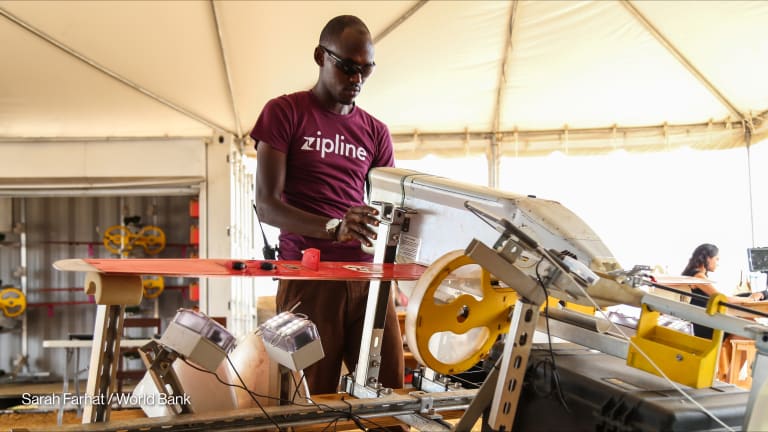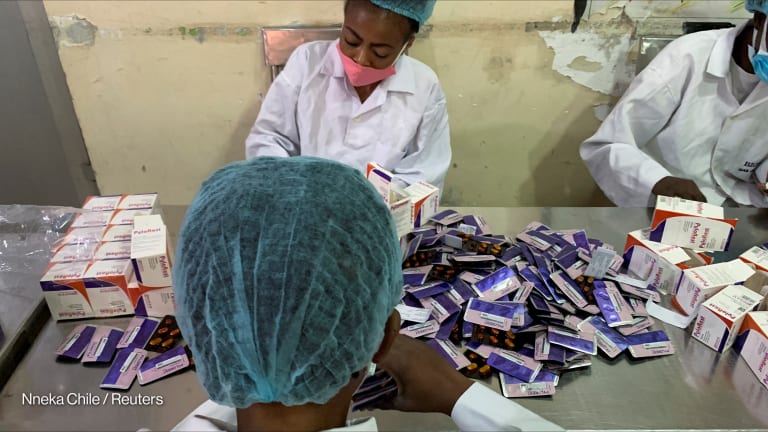
Prashant Yadav, an expert on healthcare supply chains, says the world is too dependent on India for vaccines.
The country, which stopped exporting COVID-19 vaccines in April as it deals with a devastating second wave of the virus, cannot meet the needs of its own vaccination program, let alone its global commitments, Yadav wrote in a recent piece.
Yadav highlighted the need to expand manufacturing capacity, multiply, diversify production sites, and offer Rwanda as one example of a country with a small population that would minimize the risk of domestic need getting in the way of global distribution as is happening in India.
Speaking with Devex at the 74th World Health Assembly side event, he said it’s time to rethink the supply chain not just for vaccines and all health products.
“Dependency on global structures alone for manufacturing and purchasing is useful but not always sufficient and we need, perhaps, multiple lanes in how we run the supply chains for health products,” Yadav said in a session on the future of technology in low- and middle-income countries.
He called for a focus on systems-level, not just verticalized, interventions, in a conversation with Agnes Binagwaho, vice chancellor at the University of Global Health Equity, and Raj Kumar, founding president, and editor-in-chief at Devex.
Investing in ‘systems-level interventions’
“Systems-level interventions are a good bet because they can quickly pivot and help us when there is a health emergency,” Yadav said.
He brought up three examples: Zipline, a company that delivers blood, vaccines, and other medical equipment using its fleet of unmanned aerial vehicles; Babyl, a digital health care provider; and MPharma, which helps pharmacies and their suppliers with prescription drug inventory.
“We’ve learned that the Venn diagram of overlap between systems interventions, and how much benefit they create both for vertical programs and health emergencies — that overlap is much higher than we have imagined in the past,” Yadav said.
Each of these companies pivoted during the COVID-19 pandemic. Zipline, which initially delivered only blood in Rwanda, has since expanded to delivering a range of medical products, including personal protective equipment, to rural health centers in Rwanda and Ghana.
mPharma has expanded its focus from prescription medications to diagnostic testing equipment. And in March 2020, Babyl signed an agreement with the Rwandan government to give citizens free access to its telehealth services, putting the company in the ideal position to offer virtual care.
Building resilient health systems
“COVAX is a pretext for the rich countries to sleep well at night pretending they have done something.”
— Agnes Binagwaho, vice chancellor, University of Global Health EquityBinagwaho, Rwanda’s former minister of health, who had signed the original memorandum of understanding with Zipline, echoed the call for investment in systems-level interventions.
She said the countries that have built resilient health systems have managed to keep primary care and specialized care going over the course of the COVID-19 pandemic.
Binagwaho said the key is to implement strategies that are capable of creating, managing, and repairing health systems.
“You don’t need to invent anything,” she said. “You need to be capable to create a system that will respond to any threat.”
Binagwaho added that the global mechanisms that have been set up to provide vaccines to low- and middle-income countries, including COVID-19 Vaccines Global Access, or COVAX, are insufficient.
“COVAX is a pretext for the rich countries to sleep well at night pretending they have done something,” she said.
Binagwaho noted how COVAX has not raised enough money, but Yadav said that even if it had, there are not enough vaccines on the market to buy.
Creating ‘a global enabling structure’
Prior to his current roles at the Center for Global Development and INSEAD, Yadav was a strategy leader for the supply chain at the Bill & Melinda Gates Foundation, which recently came out in support of a narrow waiver for intellectual property for COVID-19 vaccines.
When asked what he thought about the need for emergency licensing of IP in addition to expanding vaccine manufacturing, Yadav said that while IP waivers can help, it is also essential for companies to transfer their technical know-how to additional sites. That does not necessarily require an IP waiver but willingness from the company to get the new site up and running.
He highlighted a need for a “global enabling structure” so that countries do not have to send their own staff.
But Binagwaho disagreed with this view that technology transfer, not patents, is the main roadblock to expanding vaccine production.
“We need more sites,” she said, but she also called it “a crime against humanity” that so many people are dying in India when there are sites capable of producing more vaccines that “are not allowed to.”
Binagwaho noted how, because government money supported much of the pioneering work on mRNA vaccine technology, those benefits should be shared more widely.
Yadav and Binagwaho both highlighted challenges with COVAX.
But Yadav said that global coordination would remain essential for sharing information.
“Who’s buying? Who’s manufacturing? How much?” Yadav said. “For that, we need to coordinate no matter which mechanism is used to purchase.”








